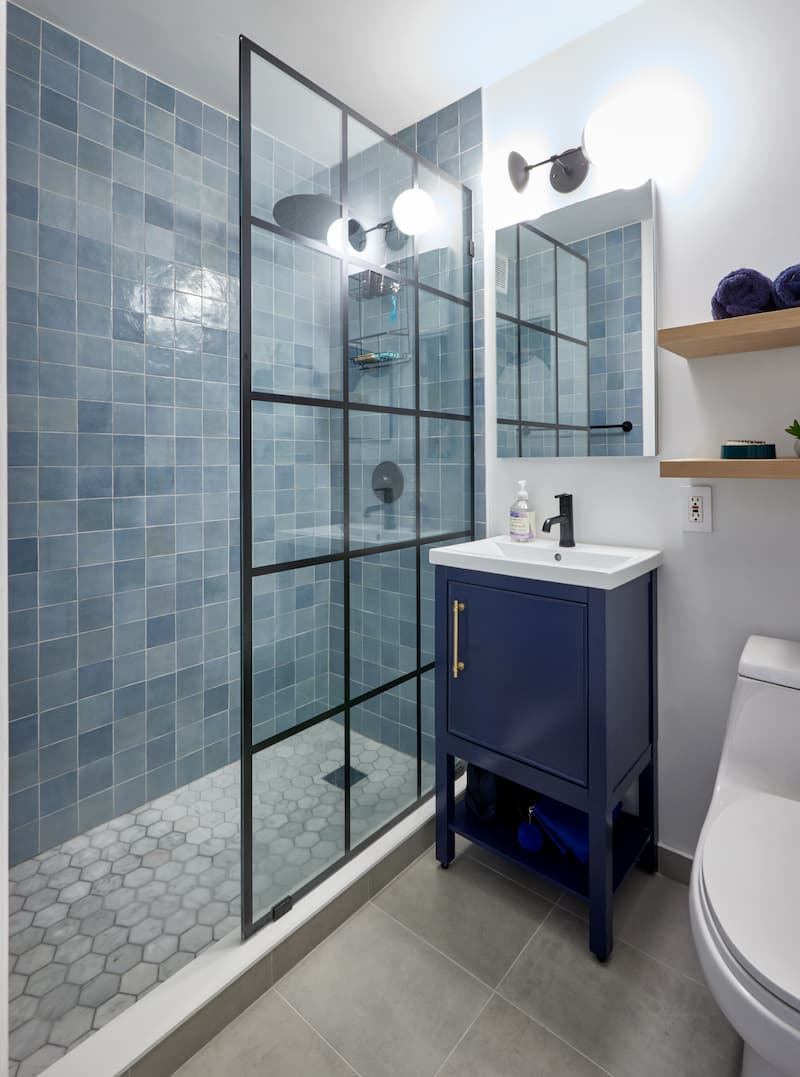Philly Kitchen Remodeling: Costs, Contractor Tips, and What to Expect

In This Article
A kitchen remodel in Philadelphia isn’t just about new cabinets or countertops—it’s about making one of the most-used spaces in your home work better for how you live. Whether you’re renovating to boost property value, improve everyday function, or make your home more appealing to future renters, the payoff can be well worth it. But kitchen remodeling in Philadelphia also comes with a unique set of challenges. From navigating city permits to working within narrow rowhomes and older buildings, a successful renovation takes planning, expertise, and a team that understands the city’s quirks. Here’s what to expect—and how to make your Philadelphia kitchen remodel as smooth and worthwhile as possible.
Skip the Lengthy Research Process—Block Can Recommend Prescreened Kitchen Remodelers
Finding a trustworthy contractor is often the most stressful part of any kitchen renovation. Philadelphia’s market is filled with options, but not all remodelers are created equal. Block Renovation takes the guesswork out of the process by connecting you with prescreened, highly rated kitchen remodelers who have a proven track record in the city. Each contractor in Block’s network is thoroughly vetted for licensing, insurance, craftsmanship, and client satisfaction. This means you can skip hours of research, avoid unreliable referrals, and start your project with confidence, knowing your kitchen is in capable hands.
Block Renovation is proud to serve both Philadelphia and nearby communities like Bucks County, Delco, and the Main Line.
Renovate with confidence every step of the way
Step 1: Personalize Your Renovation Plan
Step 2: Receive Quotes from Trusted Contractors
Step 3: Let Us Handle the Project Details

How Much Does It Typically Cost to Remodel a Philadelphia Kitchen?
Kitchen remodeling costs in Philadelphia are shaped by a variety of factors, including the age and layout of your home, the quality of materials you select, and the complexity of the work involved.
For a mid-range kitchen remodel, most Philadelphia homeowners spend between $30,000 and $70,000. This typically covers new cabinetry, countertops, appliances, flooring, lighting, and some layout changes. If you’re aiming for a high-end renovation—think custom cabinetry, luxury appliances, stone countertops, and major structural changes—costs can easily exceed $100,000, especially in historic or architecturally significant homes.
Labor costs in Philadelphia are generally lower than in cities like New York or San Francisco, but higher than in many suburban or rural areas. The city’s older housing stock can also introduce hidden costs: outdated wiring, plumbing, or structural issues often surface once demolition begins, so it’s wise to set aside a contingency fund of at least 10–20%. Smaller kitchens, such as those in rowhomes or condos, may have a higher cost per square foot because fixed costs (like permits and design fees) are spread over a smaller area. On the other hand, a simple cosmetic refresh—new cabinet fronts, paint, and updated fixtures—can sometimes be accomplished for $15,000–$25,000, but this won’t address underlying infrastructure or layout issues.
What to Expect from the Permitting Process in Philadelphia
Philadelphia’s Department of Licenses and Inspections (L&I) requires permits for most kitchen remodels, especially when the work goes beyond simple cosmetic updates. If your project involves moving or adding plumbing lines (such as relocating a sink or installing a new dishwasher), updating electrical wiring, knocking down or building walls, or changing the kitchen’s footprint, you’ll almost certainly need a permit. Installing new windows or doors, altering ventilation systems, or making structural changes—like opening up a load-bearing wall—also require city approval.
For example, if you’re replacing cabinets and countertops in the same layout, you may not need a permit. But if you’re adding an island with a sink, moving the stove, or upgrading the electrical panel to support new appliances, permits and inspections will be required. In historic properties or rowhomes, additional reviews may be necessary, and you may need to submit plans for approval by the Philadelphia Historical Commission or your neighborhood association. The permitting process can add time and cost to your project, but it’s essential for safety, resale value, and legal compliance.
A reputable Philadelphia kitchen remodeler—like those recommended by Block Renovation—will handle the permitting process for you. Still, it’s wise to ask about timelines and required documentation up front.
Turn your renovation vision into reality
Get matched with trusted contractors and start your renovation today!
Find a Contractor
Special Considerations for Your Philadelphia Kitchen Remodel
Philadelphia’s housing stock is as diverse as its neighborhoods, and each type of property brings its own renovation challenges.
What if You’re Renovating a Kitchen in a Philadelphia Rowhome?
Rowhomes are a Philadelphia staple, instantly recognizable for their narrow footprints and shared walls. One of the most distinctive features you may encounter during a rowhome kitchen remodel is exposed brick. While this original masonry can become a stunning focal point, it often requires sealing or repair to ensure it’s both attractive and suitable for a kitchen environment.
Ventilation is another unique challenge in Philadelphia rowhomes kitchens; with limited access to exterior walls, installing or upgrading ductwork and venting for range hoods may require creative solutions and, in some cases, coordination with neighbors or city officials. Plumbing upgrades or rerouting can also be more complex, especially if you’re hoping to move sinks or appliances.
The compact dimensions of Philadelphia rowhomes demand thoughtful planning and smart design choices. Layout options may be limited by the narrow width of the home, so every inch counts. Choosing compact appliances can help maximize usable space without sacrificing functionality. Vertical storage—such as tall cabinets, open shelving, or hanging pot racks—can make the most of high ceilings and keep countertops clear. Pull-out pantries, corner drawers, and built-in organizers are especially valuable in tight quarters. Ultimately, embracing the character and constraints of a rowhome kitchen can lead to a space that’s both highly functional and uniquely Philadelphian.
What if You’re Remodeling a Kitchen in an Older, Historic Property?
Philadelphia is rich in historic homes, from 19th-century Italianate and Federal-style townhouses to Victorian twins, Colonial Revivals, and pre-war apartment buildings. Remodeling a kitchen in an older property often means dealing with outdated wiring, plumbing, and sometimes uneven floors or walls. You may encounter original materials like plaster, lathe, or even knob-and-tube electrical systems, all of which can complicate demolition and installation.
Preserving historic details—like moldings, woodwork, or antique tile—can add value and charm, but may require specialized trades. In some cases, you’ll need approval from the Philadelphia Historical Commission before making significant changes, especially if your home is in a designated historic district or features protected architectural elements.
What if You’re Remodeling a Kitchen in a Condo?
Condo kitchen remodels in Philadelphia come with their own set of rules. Homeowners’ associations (HOAs) often require approval for renovations, and you may need to submit plans or work with approved contractors.
Access can be complicated by elevators, shared hallways, and limited work hours, which can extend the project timeline. Noise restrictions and building policies may also affect when and how work can be done. It’s important to communicate with your HOA early and ensure your contractor is familiar with condo renovation protocols.
Renovating Kitchens for Future Renters
Nearly half of Philadelphia residents rent. If you’re a landlord remodeling a kitchen to be used by tenants, there are special considerations to take into account.
Durable, easy-to-clean materials—like quartz countertops, solid-surface backsplashes, and flat-front cabinets—stand up to heavy use and are easy to maintain between tenants. Neutral color palettes and classic finishes appeal to a wide range of renters, while maximizing storage and counter space can make your property more competitive. Consider energy-efficient appliances and fixtures, which can lower utility costs and attract eco-conscious renters. For more ideas, read Fixing Up Rental Properties? 15 High-ROI Renovations to Increase Value.
Renovate now, pay later
Achieve the space you're looking for today, while financing it over time with our trusted partner.*
*Not available in NYC
Learn More
What to Expect From Your Philadelphia Kitchen Remodel
A well-planned kitchen remodel in Philadelphia typically follows these steps:
- Initial Consultation & Visioning: Meet with a designer or contractor to discuss your goals, budget, and must-haves. This is the time to share inspiration, talk about how you use your kitchen, and identify any unique challenges your space presents.
- Site Assessment & Measurements: Your remodeler will visit your home to take detailed measurements, assess the condition of existing systems, and identify any structural or code issues that could affect the project.
- Design & Planning: Work with your designer or contractor to develop a layout, select materials, and finalize finishes. For historic or condo properties, this may also involve submitting plans for approval by the city, HOA, or historical commission.
- Permitting: Your contractor will prepare and submit permit applications to Philadelphia’s Department of Licenses and Inspections (L&I), and coordinate any required reviews or inspections.
- Demolition & Prep: Once permits are approved, demolition begins. In older homes, this phase may reveal hidden issues—like outdated wiring or plumbing—that need to be addressed before new work can proceed.
- Rough Construction: Structural changes, framing, plumbing, and electrical work are completed. Inspections may be required at various stages to ensure code compliance.
- Installation: Cabinets, countertops, appliances, flooring, and fixtures are installed. This is when your new kitchen really starts to take shape.
- Finishing Touches: Painting, backsplash installation, hardware, and final details are completed. Your contractor will walk through the space with you to create a punch list of any outstanding items.
- Final Inspection & Clean-Up: The city may require a final inspection to close out permits. Your contractor will ensure the space is clean, safe, and ready for use.
Design a Home That’s Uniquely Yours
Block can help you achieve your renovation goals and bring your dream remodel to life with price assurance and expert support.
Get Started
Find the Right Kitchen Remodeler With Help From Block
The Philadelphia contractor you choose can make all the difference in your kitchen remodel experience. At Block Renovation, our vetting process goes far beyond checking for basic licensing and insurance. We carefully evaluate each contractor for craftsmanship, reliability, communication skills, and client satisfaction, thoroughly reviewing references and past projects to ensure consistent quality. Only remodelers who meet our high standards are invited into the Block network, so you can feel confident your project is in capable hands.
Every kitchen renovation completed through Block is backed by a one-year workmanship warranty, providing peace of mind long after the work is done. From your initial consultation to the final walkthrough, Block is committed to being your trusted partner in creating a Philadelphia kitchen you’ll love for years to come.
To learn more about pricing and planning common projects, read our localized guides to Philadelphia basement design, bathroom remodels, and home renovation costs.

Written by Block Renovation

Renovate confidently with Block
Easily compare quotes from top quality contractors, and get peace of mind with warranty & price protections.
Thousands of homeowners have renovated with Block

4.5 Stars (100+)

4.7 Stars (100+)

4.5 Stars (75+)
Renovate confidently
- Top quality contractors
- Warranty & price protections
- Expert resources

